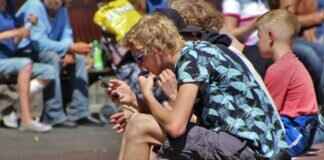Amer Rabee, a 14-year-old American boy, was tragically killed by Israeli soldiers in the West Bank while picking almonds with his friends. The soldiers labeled them as “three terrorists” who were throwing rocks at passing cars, sparking a fatal response that left Amer dead and two others injured. The village of Turmus Ayya, home to many U.S. citizens, is now mourning the loss of one of its children amid a cloud of uncertainty surrounding the lack of response from President Donald Trump and the U.S. government.
The family of Amer Rabee insists that he had no violent tendencies or political affiliations, describing him as a bright, intelligent boy who had moved to the West Bank from Saddle Brook, New Jersey in 2013. Amer’s father, Mohammed Rabee, highlights his son’s innocence and the shock of the tragic incident that claimed his life. The grief-stricken family is left questioning the silence from U.S. authorities and the lack of acknowledgment from President Trump following Amer’s death.
Family’s Desperation and Plea for Support
After learning of his son’s involvement in the shooting, Mohammed Rabee desperately reached out to the U.S. Embassy in Jerusalem for intervention and assistance. The process of identifying themselves and seeking help dragged on, leaving the family in agony as they tried to save Amer’s life. Despite their efforts, Amer did not survive, and the family was left grappling with the aftermath of the tragedy and the absence of a timely response from the U.S. government.
The U.S. Embassy eventually released a statement offering condolences to the Rabee family, but the community in Turmus Ayya, including Amer’s relatives, expressed a desire for more significant acknowledgment from President Trump. The lack of recognition for Amer’s death during a meeting between Trump and Israeli Prime Minister Benjamin Netanyahu added to the family’s distress, prompting questions about the differential treatment of an American citizen who lost his life in the West Bank.
Challenges Faced by Palestinian Americans in Turmus Ayya
Turmus Ayya, often referred to as “little America” due to its large population of Palestinian Americans, serves as a cultural bridge between the West Bank and the U.S. Despite the town’s dual identity, it faces ongoing threats and incursions, with settler violence on the rise in the region. Amer’s family recounts instances of vandalism and attacks by settlers, highlighting the precarious situation faced by residents in Turmus Ayya and the constant fear of violence.
The escalating tensions and clashes in the West Bank underscore the complex realities of life for Palestinian Americans, who navigate between two worlds while seeking safety and security in a volatile environment. The tragic death of Amer Rabee sheds light on the struggles faced by families in Turmus Ayya and the urgent need for recognition and justice in the face of violence and loss.
As the community mourns the loss of a young life cut short by conflict and misunderstanding, the call for justice and accountability resonates beyond the borders of Turmus Ayya. The story of Amer Rabee serves as a poignant reminder of the human cost of conflict and the enduring quest for peace and dignity in the midst of tragedy.














